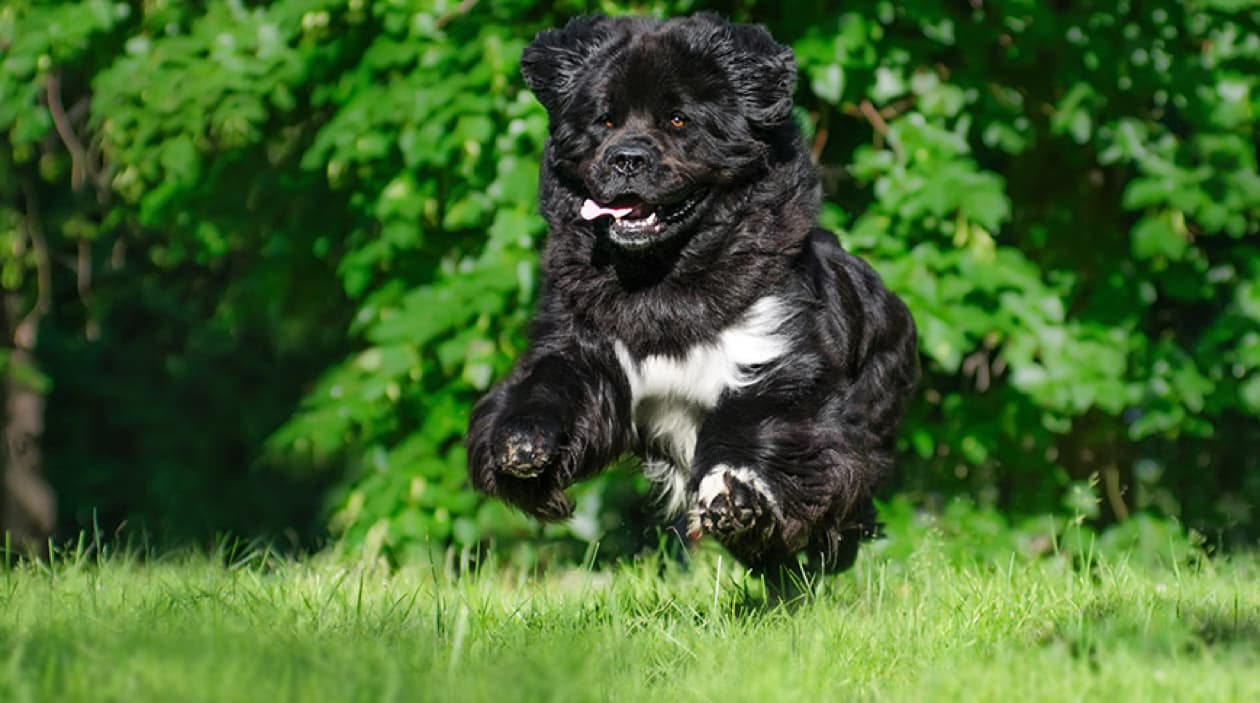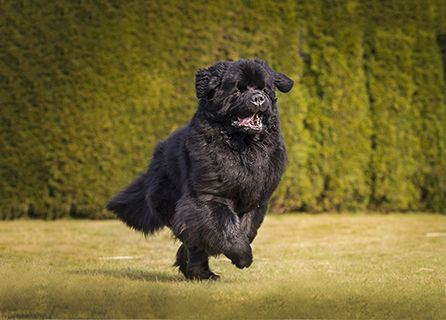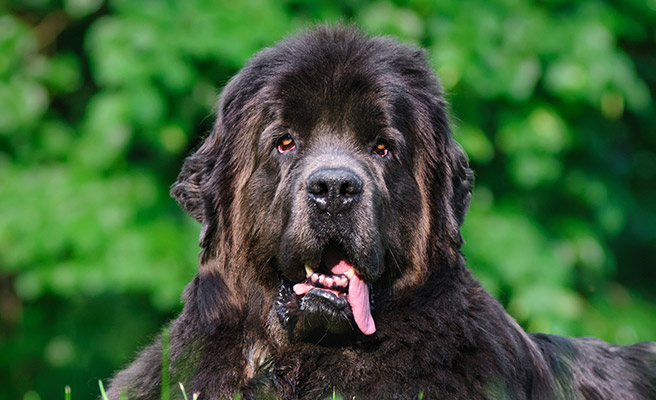
Newfoundland breed guide
Newfoundlands are a sweet and loving breed that works hard and plays hard. Find out more about this large, mellow dog, from their temperament and how they should be groomed, to their health and exercise needs.
Breed information and advice
Newfoundland dogs are known for their hard-working nature – that’s why you’ll find them in the working breed group. With their huge size and friendly personality, they're commonly referred to as the ‘gentle giant’ of dogs. Here's more you should know:
- As such a large dog when fully grown, the Newfoundland will need a spacious home.As such a large dog when fully grown, the Newfoundland will need a spacious home.
- Their thick and lustrous coat will require brushing two or three times a week, especially during spring and autumn when shedding is at its peak.Their thick and lustrous coat will require brushing two or three times a week, especially during spring and autumn when shedding is at its peak.
- They'll typically weigh between 45kg and 68kg, when fully grownThey'll typically weigh between 45kg and 68kg, when fully grown.
- A healthy Newfoundland will usually live for 8 to 10 years.A healthy Newfoundland will usually live for 8 to 10 years.
Typical size of a Newfoundland: Large: 63cm-74cm

Recommended exercise and nutrition
Due to their size and adventurous nature, your Newfoundland requires a good walk every day to burn off some of their excitable energy. As a puppy, they'll grow at a fast rate and you need to look after their joints, which means more time on the grass than on the pavement.
Two meals a day will be enough for your dog, but try to include a good mix of protein and fat for your Newfoundland puppy as they’ll need it to grow strong. Quantities will vary depending on the size, age and exercise levels of your dog, and always read the packet.
Up to one hour of exercise per day
Newfoundlands love to swim, so it might be a good idea to try to incorporate a dip into your dog’s regular exercise routine.

Common health problems and illnesses
Your Newfoundland will need all of the usual vaccinations and check-ups to help protect them against common ailments. There are some conditions which this breed is more prone to though, and you may want to familiarise yourself with the symptoms, so you know what to look out for.
Hip dysplasia is where the ball and socket of the dog’s hip do not fit properly leading to the deterioration of the bone and loss of function of the joint. This damage causes swelling, pain and arthritis so it’s vital to identify the disease as early as possible to be able to manage or avoid discomfort for your dog. If your Newfoundland starts having trouble standing up and jumping, this can be an early sign. Other symptoms to look for are swaying when they walk, joint pain, stiffness and a decreased range of motion. Hip dysplasia can be made worse by obesity, and exercising them too much or too little. It can be eased by anti-inflammatory medication, physical therapy or - in some cases - surgery.
Entropion is a condition of the eyelids when instead of lying flat against the eye surface, the edge of the lid rolls over so the hairs of the skin make contact with the eye surface. It’s more common for the lower lid to be affected. In puppies, sometimes temporary tacking sutures are used to correct the problem and with growth, sometimes no further procedures are necessary. In more mature dogs, surgical procedures are often needed.
Ectropion is an outward turning, gaping or eversion of an eyelid and almost always affects the lower lids. Ectropion needs surgical correction less commonly than entropion.
This is a condition, usually found in large dogs, where the stomach fills with gas and fluid and twists on itself. It can be life-threatening so early recognition of symptoms is a major factor in the successful treatment of GDV. Some steps to preventing GDV are:
- Good health
- Eliminate stress
- Feed small portions
- Slow down eating
- Rest before and after meals
- Control water consumption
Some early signs of GDV are:
- Restlessness
- Pacing
- Swollen or distended abdomen
- Painful abdomen
- Overall look of distress
- Retching or attempts to vomit with no success
- Excessive drooling
- Panting or rapid breathing
Talk to your vet about your dog's risk and any preventative measures.
Aortic stenosis is a heart disease that is present at birth. Dogs affected with aortic stenosis have a narrowing at the aortic valve of the heart. In many cases, affected dogs do not show any signs. Aortic stenosis is often initially detected on a routine physical examination, when the vet notices a heart murmur. In moderate to severe cases, signs may be noted at birth; in mild cases, the murmur may not be noted until the dog is 6-12 months old.
In dogs with severe disease, you may observe signs related to heart dysfunction. These signs include lethargy, exercise intolerance, shortness of breath, and fainting. These signs are typically related to the heart’s inability to circulate blood effectively. Speak to your vet if you have any concerns.
Osteochondrosis is a disease that can affect a variety of the joints of a young, growing dog's body. The disease is one of inappropriate bone growth that leads to painful lesions within the joints.
Osteochondrosis of the shoulder and elbow occurs primarily in large and giant breed dogs. The cause is as yet poorly understood, but genetics, rapid growth, high planes of nutrition (protein and fat-rich diets), hard surfaces and excess dietary calcium have all been associated with it. The most commonly recommended treatment for osteochondrosis's effects involves surgery. For more information and advice, speak to your vet.
Find out about insurance for your Newfoundland
Learn how pet insurance works and what kind of cover you might need for your dog.
Grooming advice
Try to aim for three brushes a week of your Newfoundland’s coat, especially during the spring and autumn when they'll shed the most. A thorough combing removes the loose hairs and fur, and helps to keep your pet neat and tidy.
They'll only need bathing every three months too - any more and you risk losing some of the lustre of their coat. They'll also get a regular rinse from all the swimming they love to do. This is especially handy because, with their fluffy coat, your Newfoundland is likely to get into all kinds of muddy trouble. If the challenge of maintaining their coat proves too much, you can always consult with a dog groomer to get some useful tips.
Brush their teeth three times a week - dogs are still at risk of cavities and proper cleaning at the vet can be stressful.
Fun and interesting facts
- Ancestors of Newfoundland dogs were first thought to have originated from Europe, but they’re named after the Canadian region that they helped to settle.Ancestors of Newfoundland dogs were first thought to have originated from Europe, but they’re named after the Canadian region that they helped to settle.
- A Newfoundland will drool a lot.A Newfoundland will drool a lot.
- They are among the most obedient breeds and will love being trained from an early age.They are among the most obedient breeds and will love being trained from an early age.
- When JM Barrie originally devised the story of Peter Pan, he was inspired by his own Newfoundland, Luath, to cast the Darling family nurse Nana as the very same breed.When JM Barrie originally devised the story of Peter Pan, he was inspired by his own Newfoundland, Luath, to cast the Darling family nurse Nana as the very same breed.
- The breed’s famous rescue instinct kicked in during the sinking of the Titanic when a Newfoundland named Rigel swam the waters searching for his master.The breed’s famous rescue instinct kicked in during the sinking of the Titanic when a Newfoundland named Rigel swam the waters searching for his master.
Important information
The content on this page aims to offer an informative introduction to pet breeds, but does not constitute expert veterinary advice. If your dog or cat falls ill or has an injury, contact your vet immediately.
All facts and figures were correct at date of publication and were compiled using a range of sources.
Discover more breeds
Browse our other cat and dog guides to learn about some of the UK’s most popular breeds.